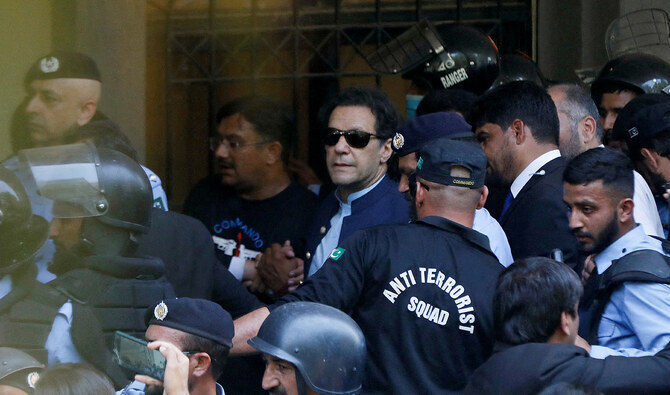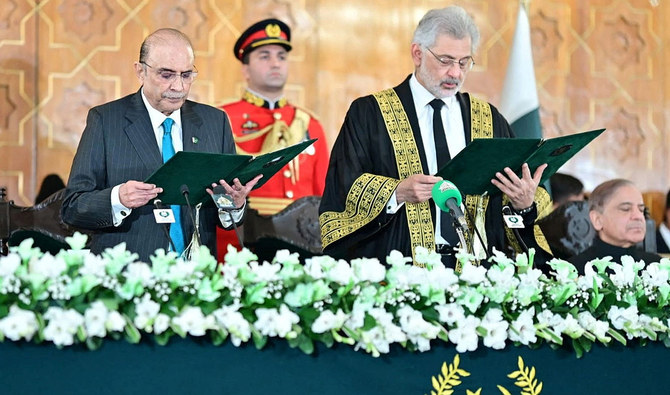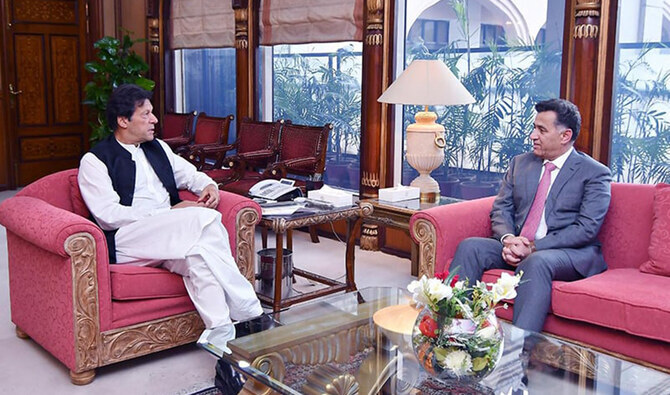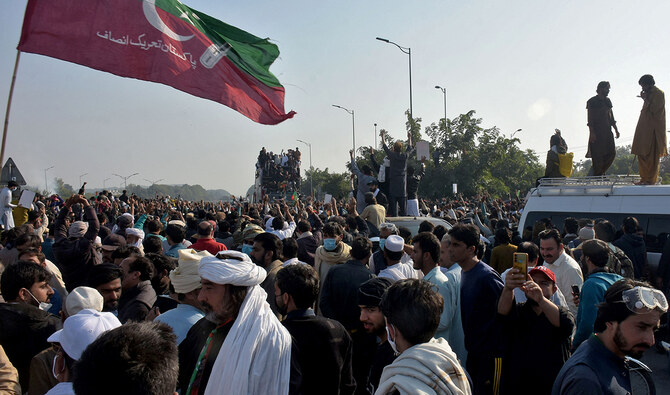LAHORE: A father in Pakistan is suspected of killing his two daughters and their four children by setting their house ablaze because one of the women married against his wishes, police said.
Manzoor Hussain is being hunted by police after allegedly setting fire to the home that sisters Fauzia Bibi and Khurshid Mai shared in a village in the Muzaffargargh district of central Pakistan, police official Abdul Majeed told Reuters by phone.
Mai’s husband also died in the blaze, Majeed said.
Bibi had married Mehboob Ahmad about 18 months ago against her father’s will in a so-called love marriage, according to the official, as opposed to an arranged marriage.
“The incident is outcome of the rivalry between the two families over the love marriage,” Majeed said.
Hussain, the father being searched for, lives in a nearby village, he added.
Bibi’s husband Ahmad told police he was not at home at the time of the fire and had found the house ablaze when he returned from work early in the morning, according to his statement to officers, which was seen by Reuters.
Ahmad said his four-month-old son had died, along with Mai’s three children aged two, six and 13.
Hundreds of women in Pakistan are killed by relatives every year for marrying without consent, or against their family’s wishes, according to the Human Rights Commission of Pakistan.
Father suspected of killing two daughters, four grandchildren in Pakistan marriage feud
https://arab.news/6xzum
Father suspected of killing two daughters, four grandchildren in Pakistan marriage feud

- Manzoor Hussain hunted by police after allegedly setting fire to home of sisters Fauzia Bibi and Khurshid Mai in Muzaffargargh district
- Bibi married Mehboob Ahmad against her father's will in a so-called love marriage, Mai's husband also died in blaze
Pakistan’s northwestern province announces $360,000 in scholarships for minority students

- Pakistan’s religious minorities have long complained of discrimination, economic hardships
- Khyber Pakhtunkhwa says protection of minority rights remains an integral part of its agenda
PESHAWAR: The government of Pakistan’s northwestern Khyber Pakhtunkhwa (KP) province on Tuesday announced scholarships worth Rs100 million ($360,000) for minority students, aiming to bolster their educational opportunities, according to an official statement issued by the Chief Minister’s Office.
Pakistan’s religious minorities have long complained of discrimination and economic hardships, which often leave them unable to afford quality education for their children. In KP, a province that has faced a persistent security deficit in recent decades, minorities have been particularly vulnerable, with militants and other violent individuals targeting churches and killing members of the Sikh community, adding to their challenges.
“Special training will be provided to children of minority communities at the Provincial Government Service Training Institute, helping them prepare for competitive exams,” Chief Minister Ali Amin Gandapur said, adding: “Minority students will receive scholarships worth 100 million rupees.”
The statement followed a meeting between Gandapur and Shoaib Suddle, chairman of the One-Man Commission on Minority Rights, during which issues concerning religious minorities were discussed.
In addition to the scholarships, Gandapur announced measures to install solar systems in places of worship for religious minorities and instructed the police to form a special force to ensure the security of their leaders.
He also directed the authorities to enforce the five percent employment quota and two percent education quota reserved for minorities in government institutions.
“The protection of minority rights and their welfare remain an integral part of the provincial government’s agenda,” Gandapur said, emphasizing the pivotal role minorities play in KP’s development and interfaith harmony.
2024: A year of political turbulence in Pakistan

- The year began with the sentencing of ex-PM Imran Khan and his close aide Shah Mahmood Qureshi in the state secrets case
- The political climate continued to worsen with large-scale protests as well as sentencing of civilians by military courts
ISLAMABAD: Pakistan witnessed intense turmoil and political polarization in 2024, beginning with the sentencing of former prime minister Imran Khan and his close aide Shah Mahmood Qureshi to ten years in prison. It came just days before a controversial general election in February, which was marred by poll-rigging accusations and delayed results.
The political climate continued to worsen with large-scale protests, including a march to Islamabad by Khan supporters that turned violent, with casualties on both sides further fueling tensions.
The month of December was particularly marked by major developments from Khan’s threat of a civil disobedience movement to the criticism of the PM Shehbaz Sharif’s government by international human rights groups over the sentencing of civilians by military courts.
Amid escalating tensions, the year ended with tentative steps toward a dialogue between the government and the opposition, offering a glimmer of hope in a year dominated by political unrest, legal battles and mounting economic challenges.
EX-PM KHAN SENTENCED IN STATE SECRETS CASE
On Jan. 30, a Pakistani court handed former prime minister Imran Khan and his close aide Shah Mahmood Qureshi a ten-year jail term each in a case in which they were accused of leaking state secrets.
The case, popularly called the “cipher case,” related to an alleged diplomatic correspondence between Washington and Islamabad that Khan says was proof that his ouster as PM in 2022 was part of a US-backed “foreign conspiracy” to remove him. Washington has repeatedly denied Khan’s accusations.
The conviction came a week before general election in Pakistan, in which Khan was already barred from standing after he was convicted of corruption.

FEB. 8 NATIONAL ELECTION
In February 2024, Pakistan held its national election that was marred by a mobile Internet shutdown on the election day and unusually delayed results, leading to accusations that it was rigged and drawing concern from rights groups and foreign governments.
Former prime minister Imran Khan’s Pakistan Tehreek-e-Insaf (PTI) party was severely hamstrung ahead of the polls, with rallies banned, its party symbol taken away, and dozens of its candidates rejected from eligibility to stand.
Despite that, independent candidates backed by Khan’s party won the highest number of seats, but not enough to form a government on their own. The election saw Khan’s main political rival, Shehbaz Sharif, become prime minister after being favored by a coalition of parties.
To date, the PTI claims the vote was rigged and has held several protest rallies to demand an audit of results. Khan’s opponents and election authorities deny the allegation.

ASIF ZARDARI BECOMES PRESIDENT FOR A SECOND TERM
Veteran politician and Pakistan Peoples Party (PPP) co-chairman Asif Ali Zardari took oath as the 14th president of Pakistan on March 10.
Zardari bagged 411 votes in the indirect electoral contest held in Pakistan’s parliament and provincial assemblies. His opponent, Mahmood Khan Achakzai, who was supported by the Khan-backed Sunni Ittehad Council party, could only secure 181 votes.
Zardari served the previous stint from 2008 to 2013, during which he ushered in constitutional reforms, including the 18th amendment, to ensure greater provincial autonomy, and rolled back presidential powers.

FORMER SPYMASTER FAIZ HAMEED ARRESTED
In August, Pakistan’s army said it had arrested former spymaster Lt. Gen. (retired) Faiz Hameed and initiated court martial proceedings against him.
Hameed has since been formally arraigned on a number of charges, including engaging in political activities and violating the Pakistan Army Act post-retirement. The former general is widely seen to have been close to ex-PM Khan.
Many analysts believe that Hameed’s unprecedented arrest and possible conviction could raise the heat on Khan and be the precursor to prosecuting the jailed former prime minister before a military court on charges of treason and attempting to incite a mutiny in the military.

26TH CONSTITUTIONAL AMENDMENT
On Oct. 21, President Zardari signed into law the contentious 26th constitutional amendment that empowered parliament to choose the country’s chief justice from a panel of three senior-most judges of the Supreme Court among other things.
Another clause of the bill stated that the Supreme Court judges will be appointed by a judicial commission, led by the chief justice and comprising three senior judges, one member each from the National Assembly and the Senate, federal law minister, attorney general of Pakistan, and a nominee of the Pakistan Bar Council having not less than 15 years of practice in the Supreme Court. The commission will also monitor judges’ performance and report any concerns to the Supreme Judicial Council.
The ruling coalition had the amendment passed by both houses of parliament a night before, amid opposition from ex-PM Khan’s party and the legal fraternity, who argued it was an attempt to curtail the independence of the judiciary. The government denied it.
YAHYA AFRIDI TAKES OATH AS CHIEF JUSTICE OF PAKISTAN
Soon after the 26th constitutional amendment, a 12-member parliamentary panel nominated Justice Yahya Afridi for the top judicial post and he took oath of the chief justice’s office on Oct. 26.
Afridi replaced Chief Justice Qazi Faez Isa who retired on Oct. 25 after what was widely considered to be his controversial stint in office for a little more than a year.
Isa was accused by ex-PM Khan’s party of being aligned with the coalition government led by PM Sharif. It was under Isa’s tenure as chief justice that Pakistan’s top court denied Khan’s PTI its iconic bat symbol ahead of Feb. 8 general election, saying the party had failed to hold intra-party elections. The verdict meant all PTI candidates had to contest election as independents, which angered Khan supporters, who accused Isa of being biased in favor of Sharif.
ISLAMABAD PROTEST TO SECURE KHAN’S RELEASE
On Nov. 24, Khan’s PTI party led thousands of supporters to Islamabad, seeking to pressure the government to release the ex-premier from jail and order an audit of Feb. 8 poll results.
The protest, which was by far the largest to grip the capital since the election, resulted in clashes that Pakistan’s government says killed four law enforcers and injured hundreds of others.
The PTI says at least 12 of its supporters were killed and another 37 sustained injuries due to firing by law enforcers near Islamabad’s Jinnah Avenue on Nov. 26. Pakistani authorities have denied the deaths, saying security personnel had not been carrying live ammunition during the protest.

CALL FOR CIVIL DISOBEDIENCE MOVEMENT
Ex-PM Khan on Dec. 6 threatened to start a civil disobedience movement, days after his party led a deadly protest march on Islamabad.
The former premier demanded a judicial probe into the crackdown on the Nov 24 protest march which he said killed at least 12 of his supporters and violence on May 9 last year which killed 8, along with the release of all arrested political workers.
Khan’s call for civil disobedience movement came a day after he was indicted on charges of directing the May 9, 2023 attacks on government and military installations, to which he pleaded not guilty. The indictment was the latest in dozens of cases against the former cricket star, who has been in jail since August last year.
SENTENCING OF PAKISTANI CIVILIANS BY MILITARY COURTS
On Dec. 21, Pakistan’s military announced sentencing of 25 civilians to prison for participating in violent protests on May 9, 2023, when hundreds carrying flags of ex-PM Khan’s party had attacked government and military installations. Khan’s party denies involvement in the violent protests and has called for a judicial probe into the matter.
The United States (US), United Kingdom (UK) and the European Union (EU) expressed concerns over the verdicts, calling on Islamabad to respect the citizens’ right to a fair trial and due process. Pakistan’s Foreign Office dismissed the concerns and said the verdicts had been made under a law enacted by parliament and in line with a judgment of the country’s top court.
Days later, another 60 civilians were sentenced by military courts to jail time ranging from 2 to 10 years in connection with the riots.
TALKS TO EASE RISING POLITICAL TENSIONS
Weeks after Khan’s civil disobedience threat, PM Sharif’s government and Khan’s PTI opposition party held the first round of formal negotiations on Dec. 23, in a bid to ease prolonged political tensions.
Khan previously rejected talks with the government, saying his party would only speak to the ‘real powerbrokers’ in Pakistan, the all-powerful army, but earlier this month he set up a negotiating committee of top PTI members to open dialogue with the government for the fulfilment of two demands: the release of political prisoners and the establishment of judicial commissions to investigate May 9, 2023 and Nov. 26 violent protests.
The country has remained gripped by political unrest and uncertainty since Khan’s ouster from power through a parliamentary no-confidence vote in 2022, which has also exacerbated Pakistan’s economic hardships.
Senior government representatives have recently acknowledged that negotiations could offer a pathway out of the current political impasse, with the PTI asked to present its demands in writing at the next round of talks on Jan. 2.
Pakistan’s Punjab, UAE to form working group to boost bilateral cooperation

- Punjab Chief Minister Maryam Nawaz meets UAE Ambassador Obaid Ibrahim Salem Alzaabi in Lahore
- UAE is Pakistan’s third-largest trading partner after China and the US and a major source of remittances
ISLAMABAD: The government in Pakistan’s most populous Punjab province and the United Arab Emirates (UAE) have agreed to form a working group to promote bilateral cooperation, state-run media said on Tuesday.
The UAE is Pakistan’s third-largest trading partner after China and the United States and a major source of foreign investment. The Gulf country is also home to more than a million Pakistani expatriates and serves as an important source of workers remittances.
Pakistani policymakers consider the UAE an optimal export destination due to its geographical proximity, which minimizes transportation and freight costs while facilitating commercial transactions.
Punjab Chief Minister Maryam Nawaz met UAE’s Ambassador Hamad Obaid Ibrahim Salem Alzaabi in the eastern city of Lahore on Tuesday, Radio Pakistan said in a report.
“The UAE and Punjab government have decided to form a working group to further boost bilateral cooperation,” the report said. “During the meeting, both the sides discussed ways and means to boost economic cooperation, development projects in Punjab, and the promotion of tourism.”
Nawaz invited UAE investors to invest in Punjab and ensured special incentives and a conducive business environment for them, the state broadcaster said. The UAE envoy said that the Gulf country wants to work on additional projects in Pakistan, Radio Pakistan said.
“Hamad Obaid Ibrahim Salem Alzaabi said that the UAE is committed to promoting durable progress through public-private partnerships with the Punjab Government,” the report stated.
As Pakistan faces a prolonged macroeconomic crisis, it has reached out to Gulf countries in the past two years to attract international investment in vital economic sectors. In May, Pakistan announced that the UAE had committed $10 billion to invest in the country’s key economic sectors.
In January this year, Pakistan and the UAE signed multiple agreements worth over $3 billion for cooperation in railways, economic zones and infrastructure. In November, Pakistan and the UAE signed four Memoranda of Understanding (MoUs) covering customs, rail and airport infrastructure, maritime shipping and logistics sectors during a UAE delegation’s visit to Pakistan.
Pakistani security forces suffer deadliest year in decade while fighting insurgency— think tank

- On average, nearly seven lives were lost daily, says Islamabad-based think tank’s report
- Pakistan military says 925 insurgents, 383 soldiers were killed in operations during 2024
PESHAWAR: Pakistani security forces in 2024 suffered the highest causalities in nearly a decade while battling insurgency, an Islamabad-based think tank said.
This comes as militants attacked a security post in the country’s restive northwest, which borders Afghanistan, killing a police officer and a civilian early Tuesday.
An officer was also wounded in the attack at the Draban Post in Dera Ismail Khan, a district in Khyber Pakhtunkhwa province, local police official Abdullah Khan said, adding that the civilian was an employee of the Customs department.
No one claimed responsibility for the attack but suspicion was likely to fall on the Pakistani Taliban, also known as Tehrik-e-Taliban Pakistan, who often target security forces across the country, especially in the former tribal regions in the troubled northwest bordering Afghanistan.
The Center for Research and Security Studies said in its report Tuesday that this year was the deadliest for Pakistani security forces in 9 years.
“On average, nearly seven lives were lost daily,” according to the report which tallied “at least 685 fatalities and 444 terror attacks.” It also said: “Equally alarming were the cumulative losses of civilians and security personnel, i.e. 1612 fatalities, accounting for over 63 percent of the total recorded this year and marking 73 percent more losses compared to 934 outlaws eliminated.”
The think tank said its latest report was based on data collected from open sources, mainly media outlets. In Pakistan, the military doesn’t regularly confirm causalities among troops.
There was no immediate comment from the military on the report.
Last week, military spokesman Lt. Gen. Ahmad Sharif said in a news conference that 925 insurgents were killed in 2024, a record high compared to the past five years, while 383 soldiers were killed in such operations. He also said Pakistani security forces this year conducted 59,775 operations against insurgents in the country.
Pakistan in recent months has stepped up intelligence-based operations against the Pakistani Taliban, emboldened since the Afghan Taliban seized power in Afghanistan in 2021.
Pakistan’s Azan Ali Khan clinches Junior Under-17 Scottish Open squash title

- Khan defeats Swiss opponent to win tournament that featured players from 22 nations
- Khan will now compete in the British Open World Junior Squash Championship next year
ISLAMABAD: Pakistani squash player Azan Ali Khan clinched the Junior Under-17 Scottish Junior Open Championship 2024 in Edinburgh this week, defeating Switzerland’s Landro Wagle in the final while remaining undefeated throughout the tournament, a non-government organization sponsoring him said on Tuesday.
The Scottish Junior Open 2024 was held from Dec. 28 to 30, featuring players from 22 countries such as Canada, the United Kingdom, Italy, Egypt and the United States.
“Azlan Ali Khan has emerged as the champion of the 2024 Scottish Junior Open Championship,” Muslim Hands Pakistan, Khan’s sponsor, said in a statement. “Azan Ali Khan defeated Switzerland’s Landro Wagle in the final to win the title.”
Muslim Hands Pakistan, a branch of the UK-based charity, works to alleviate poverty, sickness and lack of education in the country. It operates over 335 schools, serving more than 25,000 students and runs projects in health care, water, sanitation and vocational training.
Khan dedicated his victory to Pakistan’s out-of-school children. The South Asian country has a population 22.8 million out-of-school children aged 5-16 years, making Pakistan the country with the second-highest number of out-of-school children.
Rana Mashood Ahmed Khan, chairman of the Pakistan Prime Minister’s Youth Program, congratulated Khan, his coach and team manager on the achievement.
“Azan Ali Khan is now preparing for the next stage and will compete in the British Open World Junior Squash Championship,” Muslim Hands said. “The British Open World Junior Squash Championship will be held from January 2 to January 6 in Birmingham.”










